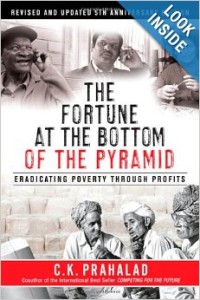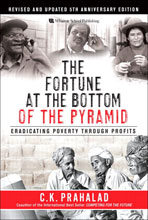 Brilliant in Isolation, Annoying for Self-Referential Insularity, August 24, 2008
Brilliant in Isolation, Annoying for Self-Referential Insularity, August 24, 2008
C.K. Prahalad
This book is certainly worth reading, and especially by those executives that do not read much (the ones with the big egos and short attention spans). I admire the authors, but I am also increasingly annoyed by the annoying self-referential insularity that charactizes “star” authors who seem to not have read much by anyone else. Publishers need to begin demanding a proper literature search and more due diligence in “connecting” the reader to dots created by others.
Let's be crystal clear: Stewart Brand, the original editor of the Co-Evolution Quarterly and the Whole Earth Review, and the founder of the Silicon Valley Hackers Conference, did more inthe 1970's and 1980's for the concept of co-creating value that this pair will ever achieve.
More recently, in the 1990's and the past ten years, Collective Intelligence, the Power of Us (a Business Week cover story 20 June 2005 that the author's do not deign to notice), Wisdom of the Crowds, Smart Mobs, and so on, have all focused on the core concept of co-creation of value.
This book loses one star for its pretentions as an immaculate conception of a core concept that has been understood by the rest of us for the past forty years.
Now, having vented in defense of other scholars and practitioners that the authors should have respected, here are my flyleaf notes that easily warrant a solid four.
+ Roadmap for business leaders that does a superb job of showing how strategy and business processes both need to receive more respect as well as deliberate management.
+ Every individual must be treated as a singular client, and no firm has the resources to do it all–being able to connect the single client with a need and the single third party able to meet the need may be the ultimate business process.
+ Most interesting to me, as a deep admirer of The Fortune at the Bottom of the Pyramid: Eradicating Poverty Through Profits, the book that showed me my final calling as intelligence officer to the public, for which I and 23 others created a non-profit, the authors drop the one billion extreme poor from their client list, and focus only on the 4 billion above that line.
+ Properly embraced, these four billion are billed by the authors–accurately and wisely in my view–as a major source of innovation and need that can power the global economy by 2015.
+ Role of Information Technology (IT), which Paul Strassmann has demonstrated is often a negative return on investment, is to bridge the gap between strategic intent and “capacity to act.”
+ Analytics in this book are primarily mathematic and data mining of existing digital information, with a token reference to external information. “Intelligence,” “decision support,” “competitive intelligence,” and “commercial intelligence” are not terms to be found in this book. The authors appear to be oblivious to the existence of the Society of Competitive Intelligence Professionals (SCIP) founded in 1986 and just now beginning to reach its potential.
+ The authors place great emphasis on the importance of the individual employee and customer, and again arouse my ire as they fail to refer back to such giants as Wilensky, Carkhuff, or Cleveland (see list of 10 books they either have not read or have chosen to forget).
+ Global standards plus local effectiveness is the key to mobilizing four billion new consumers.
+ They emphasize the importance of understanding the “hidden costs of the inflexible and archaic internal systems that exist in most firms.” They might also have thought to cite Ben Gilad on how most information reaching CEOs is late, biased, subjective, incomplete, and often wrong.
+ The three core concepts for the manager in a hurry to retain are: first, treat all others (consumers, employees, suppliers, regulators) as co-equals; second, do continuous analytics; and third, be ready to be turn on a dime. Efficiency is TIRED, flexibility (which means some redundancy) is WIRED.
For myself the real eye-opener in this book was the several case studies of what FedEx and others are doing with the detail that they amass from making their entire system transparent–not only are they tracking every package, but also every link and every inquiry–and then making sense of that to offer new services to specific INDIVIDUALs. I also appreciated the references to IBM's “ecosystem” of individuals and talents, and the emphasis on how many complex tasks can be “de-skilled” and migrated to very low-cost largely uneducated individuals, spreading the wealth while reserving the higher loads for increasingly scarce “full operational capability” programmers and managers.
I liked the authors' reference to A. V. Dhamakrishnan of Ramco India, and his focus on “evidence-based management” (page 165. I am considering publication of a work by many others on Health Intelligence, and the term I have found that rocks the health industry every time is “evidence-based medicine.”
The authors conclude that social networks are now moving into business-oriented collaboration platforms, and provide a listing of offerings that is long and interesting but not at all complete. Visit ArnoldIT.com for the real edge of the IT envelope.
This is a very fine book. It may be that publishers need to commission the literature survey, and then identify others to write forewords and afterwords that connect the dots. In no way do I demean the brilliant building block provided by this book–I am simply irritated that it hangs in space as an immaculate conception with no respect demonstrated for the considerable work by others–and to publish a book in 2008 and not even note the Business Week cover story of 20 June 2005 on “The Power of Us,” sorry, but that merits a spanking all by itself. Due diligence, anyone?
Other books, both old and new:
The exemplar: The exemplary performer in the age of productivity
The Knowledge Executive
Organizational Intelligence (Knowledge and Policy in Government and Industry)
Out of Control: The New Biology of Machines, Social Systems, & the Economic World
Smart Mobs: The Next Social Revolution
Wikinomics: How Mass Collaboration Changes Everything
The Wealth of Networks: How Social Production Transforms Markets and Freedom
Group Genius: The Creative Power of Collaboration
Collective Intelligence: Mankind's Emerging World in Cyberspace (Helix Books)
Collective Intelligence: Creating a Prosperous World at Peace
The authors might wish to demonstrate in their writing that which they preach so assidiously in this book.







